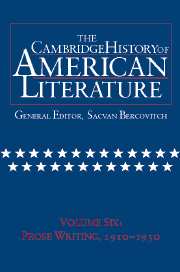Book contents
A Cultural History of the Modern American Novel: Introduction
Published online by Cambridge University Press: 28 March 2008
Summary
Near the End of The Rebel, Albert Camus speaks, first, of the “procedures of beauty,” which he defines as imaginative affirmations of “the value and the dignity common” to all human beings, and, then, of the “procedures of rebellion,” which he associates with all forms of resistance to injustice, as ways of contesting “reality while endowing it with unity.” Some of Camus’s key terms – “beauty” and “rebellion,” for example – may strike us as being too extreme. But his words place both aesthetic creation and political resistance within history and, then, implicitly define them as ways of contesting established relations. In addition, almost surreptitiously, his formulation reminds us that all of our contesting retains as one part of its motive the restoration if not the preservation of “unity.”
While celebrating itself as the land of the free, the United States has repeatedly demonstrated its willingness to deal harshly, as though in an emergency, with those who violate the written and unwritten rules by which it seeks both to authorize and to limit resistance. It tells us a great deal about the varied means and the vigilance of our society in authorizing and policing freedom that novelists as different in background, social status, and disposition as Jack London, Edith Wharton, and William Faulkner have added protagonists as different as Martin Eden, Lily Bart, and Joe Christmas to its list of victims. Yet even when it has tilted toward the dream of perfect order – as it has in crucial moments throughout its history, including the 1920s and the 1950s, for example – the United States has continued to honor, however cautiously, the counterdream of personal freedom and civil liberty, as though mindful that no culture can survive by embracing one of these dreams and abandoning the other.
- Type
- Chapter
- Information
- The Cambridge History of American Literature , pp. 1 - 9Publisher: Cambridge University PressPrint publication year: 2002



